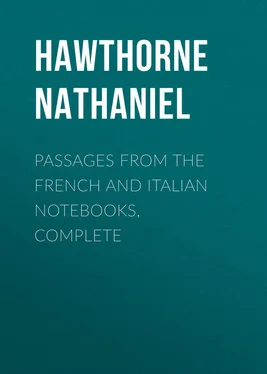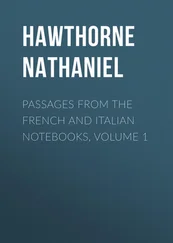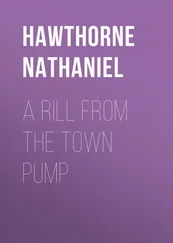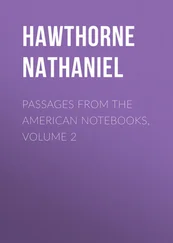Nathaniel Hawthorne - Passages from the French and Italian Notebooks, Complete
Здесь есть возможность читать онлайн «Nathaniel Hawthorne - Passages from the French and Italian Notebooks, Complete» — ознакомительный отрывок электронной книги совершенно бесплатно, а после прочтения отрывка купить полную версию. В некоторых случаях можно слушать аудио, скачать через торрент в формате fb2 и присутствует краткое содержание. Жанр: literature_19, foreign_antique, foreign_prose, на английском языке. Описание произведения, (предисловие) а так же отзывы посетителей доступны на портале библиотеки ЛибКат.
- Название:Passages from the French and Italian Notebooks, Complete
- Автор:
- Жанр:
- Год:неизвестен
- ISBN:нет данных
- Рейтинг книги:5 / 5. Голосов: 1
-
Избранное:Добавить в избранное
- Отзывы:
-
Ваша оценка:
- 100
- 1
- 2
- 3
- 4
- 5
Passages from the French and Italian Notebooks, Complete: краткое содержание, описание и аннотация
Предлагаем к чтению аннотацию, описание, краткое содержание или предисловие (зависит от того, что написал сам автор книги «Passages from the French and Italian Notebooks, Complete»). Если вы не нашли необходимую информацию о книге — напишите в комментариях, мы постараемся отыскать её.
Passages from the French and Italian Notebooks, Complete — читать онлайн ознакомительный отрывок
Ниже представлен текст книги, разбитый по страницам. Система сохранения места последней прочитанной страницы, позволяет с удобством читать онлайн бесплатно книгу «Passages from the French and Italian Notebooks, Complete», без необходимости каждый раз заново искать на чём Вы остановились. Поставьте закладку, и сможете в любой момент перейти на страницу, на которой закончили чтение.
Интервал:
Закладка:
After crossing the bridge, we kept along the right bank of the river, through the dirty and hard-hearted streets of Trastevere (which have in no respect the advantage over those of hither Rome), till we reached St. Peter's. We saw a family sitting before their door on the pavement in the narrow and sunny street, engaged in their domestic avocations, – the old woman spinning with a wheel. I suppose the people now begin to live out of doors. We entered beneath the colonnade of St. Peter's and immediately became sensible of an evil odor, – the bad odor of our fallen nature, which there is no escaping in any nook of Rome…
Between the pillars of the colonnade, however, we had the pleasant spectacle of the two fountains, sending up their lily-shaped gush, with rainbows shining in their falling spray. Parties of French soldiers, as usual, were undergoing their drill in the piazza. When we entered the church, the long, dusty sunbeams were falling aslantwise through the dome and through the chancel behind it…
March 23d. – On the 21st we all went to the Coliseum, and enjoyed ourselves there in the bright, warm sun, – so bright and warm that we were glad to get into the shadow of the walls and under the arches, though, after all, there was the freshness of March in the breeze that stirred now and then. J – and baby found some beautiful flowers growing round about the Coliseum; and far up towards the top of the walls we saw tufts of yellow wall-flowers and a great deal of green grass growing along the ridges between the arches. The general aspect of the place, however, is somewhat bare, and does not compare favorably with an English ruin both on account of the lack of ivy and because the material is chiefly brick, the stone and marble having been stolen away by popes and cardinals to build their palaces. While we sat within the circle, many people, of both sexes, passed through, kissing the iron cross which stands in the centre, thereby gaining an indulgence of seven years, I believe. In front of several churches I have seen an inscription in Latin, "INDULGENTIA PLENARIA ET PERPETUA PRO CUNCTIS MORTUIS ET VIVIS"; than which, it seems to me, nothing more could be asked or desired. The terms of this great boon are not mentioned.
Leaving the Coliseum, we went and sat down in the vicinity of the Arch of Constantine, and J – and R – went in quest of lizards. J – soon caught a large one with two tails; one, a sort of afterthought, or appendix, or corollary to the original tail, and growing out from it instead of from the body of the lizard. These reptiles are very abundant, and J – has already brought home several, which make their escape and appear occasionally darting to and fro on the carpet. Since we have been here, J – has taken up various pursuits in turn. First he voted himself to gathering snail-shells, of which there are many sorts; afterwards he had a fever for marbles, pieces of which he found on the banks of the Tiber, just on the edge of its muddy waters, and in the Palace of the Caesars, the Baths of Caracalla, and indeed wherever else his fancy led him; verde antique, rosso antico, porphyry, giallo antico, serpentine, sometimes fragments of bas-reliefs and mouldings, bits of mosaic, still firmly stuck together, on which the foot of a Caesar had perhaps once trodden; pieces of Roman glass, with the iridescence glowing on them; and all such things, of which the soil of Rome is full. It would not be difficult, from the spoil of his boyish rambles, to furnish what would be looked upon as a curious and valuable museum in America.
Yesterday we went to the sculpture-galleries of the Vatican. I think I enjoy these noble galleries and their contents and beautiful arrangement better than anything else in the way of art, and often I seem to have a deep feeling of something wonderful in what I look at. The Laocoon on this visit impressed me not less than before; it is such a type of human beings, struggling with an inextricable trouble, and entangled in a complication which they cannot free themselves from by their own efforts, and out of which Heaven alone can help them. It was a most powerful mind, and one capable of reducing a complex idea to unity, that imagined this group. I looked at Canova's Perseus, and thought it exceedingly beautiful, but, found myself less and less contented after a moment or two, though I could not tell why. Afterwards, looking at the Apollo, the recollection of the Perseus disgusted me, and yet really I cannot explain how one is better than the other.
I was interested in looking at the busts of the Triumvirs, Antony, Augustus, and Lepidus. The first two are men of intellect, evidently, though they do not recommend themselves to one's affections by their physiognomy; but Lepidus has the strangest, most commonplace countenance that can be imagined, – small-featured, weak, such a face as you meet anywhere in a man of no mark, but are amazed to find in one of the three foremost men of the world. I suppose that it is these weak and shallow men, when chance raises them above their proper sphere, who commit enormous crimes without any such restraint as stronger men would feel, and without any retribution in the depth of their conscience. These old Roman busts, of which there are so many in the Vatican, have often a most lifelike aspect, a striking individuality. One recognizes them as faithful portraits, just as certainly as if the living originals were standing beside them. The arrangement of the hair and beard too, in many cases, is just what we see now, the fashions of two thousand years ago having come round again.
March 25th. – On Tuesday we went to breakfast at William Story's in the Palazzo Barberini. We had a very pleasant time. He is one of the most agreeable men I know in society. He showed us a note from Thackeray, an invitation to dinner, written in hieroglyphics, with great fun and pictorial merit. He spoke of an expansion of the story of Blue Beard, which he himself had either written or thought of writing, in which the contents of the several chambers which Fatima opened, before arriving at the fatal one, were to be described. This idea has haunted my mind ever since, and if it had but been my own I am pretty sure that it would develop itself into something very rich. I mean to press William Story to work it out. The chamber of Blue Beard, too (and this was a part of his suggestion), might be so handled as to become powerfully interesting. Were I to take up the story I would create an interest by suggesting a secret in the first chamber, which would develop itself more and more in every successive hall of the great palace, and lead the wife irresistibly to the chamber of horrors.
After breakfast, we went to the Barberini Library, passing through the vast hall, which occupies the central part of the palace. It is the most splendid domestic hall I have seen, eighty feet in length at least, and of proportionate breadth and height; and the vaulted ceiling is entirely covered, to its utmost edge and remotest corners, with a brilliant painting in fresco, looking like a whole heaven of angelic people descending towards the floor. The effect is indescribably gorgeous. On one side stands a Baldacchino, or canopy of state, draped with scarlet cloth, and fringed with gold embroidery; the scarlet indicating that the palace is inhabited by a cardinal. Green would be appropriate to a prince. In point of fact, the Palazzo Barberini is inhabited by a cardinal, a prince, and a duke, all belonging to the Barberini family, and each having his separate portion of the palace, while their servants have a common territory and meeting-ground in this noble hall.
After admiring it for a few minutes, we made our exit by a door on the opposite side, and went up the spiral staircase of marble to the library, where we were received by an ecclesiastic, who belongs to the Barberini household, and, I believe, was born in it. He is a gentle, refined, quiet-looking man, as well he may be, having spent all his life among these books, where few people intrude, and few cares can come. He showed us a very old Bible in parchment, a specimen of the earliest printing, beautifully ornamented with pictures, and some monkish illuminations of indescribable delicacy and elaboration. No artist could afford to produce such work, if the life that he thus lavished on one sheet of parchment had any value to him, either for what could be done or enjoyed in it. There are about eight thousand volumes in this library, and, judging by their outward aspect, the collection must be curious and valuable; but having another engagement, we could spend only a little time here. We had a hasty glance, however, of some poems of Tasso, in his own autograph.
Читать дальшеИнтервал:
Закладка:
Похожие книги на «Passages from the French and Italian Notebooks, Complete»
Представляем Вашему вниманию похожие книги на «Passages from the French and Italian Notebooks, Complete» списком для выбора. Мы отобрали схожую по названию и смыслу литературу в надежде предоставить читателям больше вариантов отыскать новые, интересные, ещё непрочитанные произведения.
Обсуждение, отзывы о книге «Passages from the French and Italian Notebooks, Complete» и просто собственные мнения читателей. Оставьте ваши комментарии, напишите, что Вы думаете о произведении, его смысле или главных героях. Укажите что конкретно понравилось, а что нет, и почему Вы так считаете.












